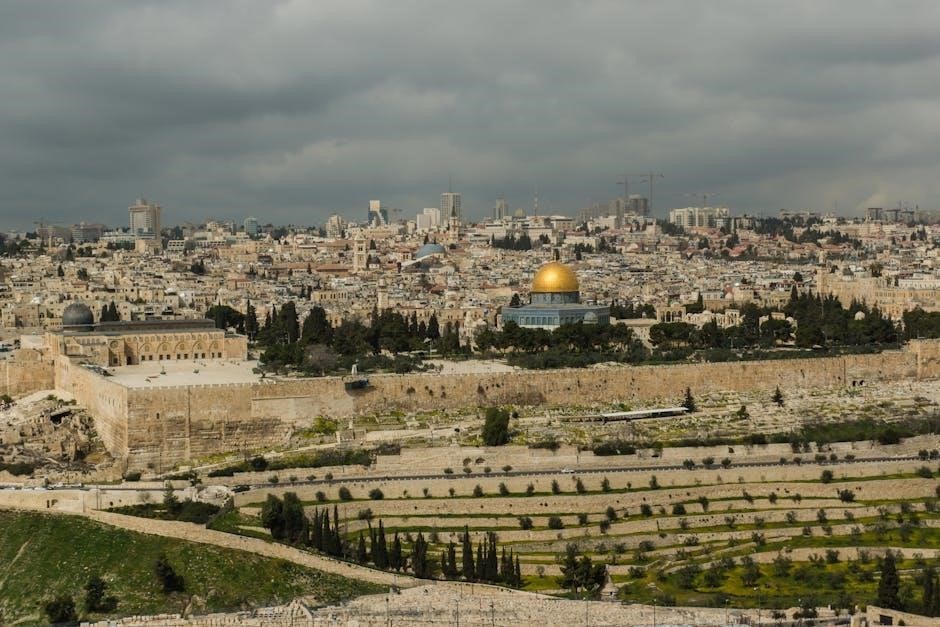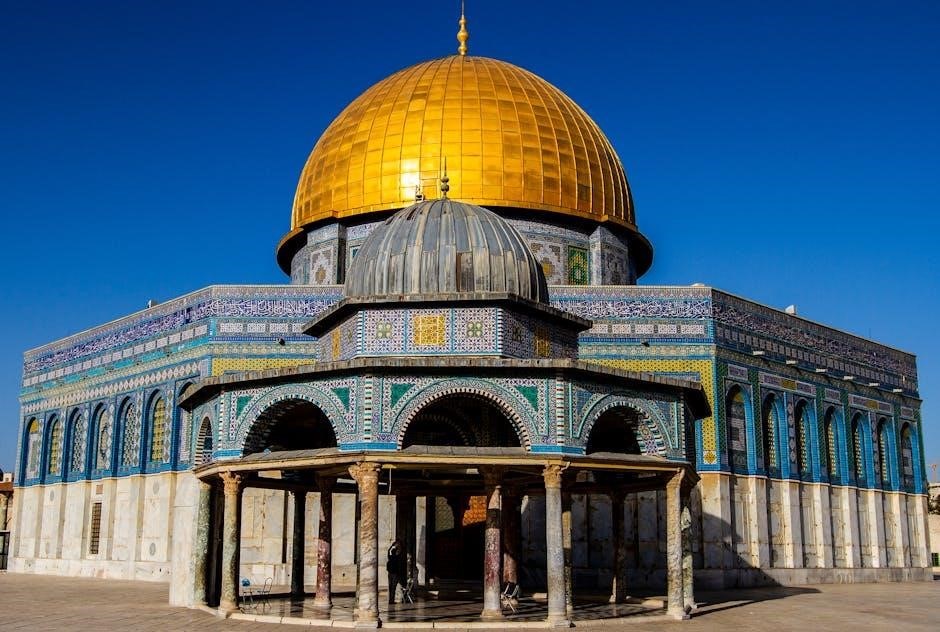The 12 Gates of Jerusalem symbolize divine completeness, unity, and spiritual transformation. Each gate represents an aspect of God’s character, serving as portals to deeper connection and enlightenment.
Overview of the Significance of the 12 Gates

The 12 Gates of Jerusalem hold profound spiritual significance, symbolizing completeness, unity, and divine perfection. Rooted in biblical tradition, they are linked to the 12 tribes of Israel and the New Jerusalem described in Revelation. Each gate serves as a portal to spiritual connection, representing God’s plan for His people. They embody unity and inclusion, welcoming all who seek divine presence. Historically, the gates were not just physical entrances but also spiritual thresholds, reflecting the journey of faith and transformation. Their symbolism extends to personal growth, inviting individuals to reflect on their spiritual paths. The gates are a timeless reminder of God’s promise and the eternal nature of His kingdom, bridging earthly and heavenly realms.
Historical Context of the Gates in Biblical Tradition
The 12 Gates of Jerusalem are deeply rooted in biblical history, originating from Ezekiel’s vision of a restored Jerusalem (Ezekiel 48). These gates symbolize the unity of God’s people, with each gate named after one of the 12 tribes of Israel. Historically, the gates were not just physical entrances but also spiritual symbols of God’s divine presence and covenant with His people. In biblical tradition, they represented access to the holy city, embodying the promise of redemption and divine dwelling. The gates were also a focal point of worship and communal gatherings, reflecting the heart of Jewish and Christian spirituality. Their historical significance is further emphasized in Revelation 21, where they are described as part of the New Jerusalem, signifying eternal unity and divine perfection.

The Biblical Foundation of the 12 Gates
The 12 Gates are rooted in biblical scripture, notably Revelation 21:12-14, where each gate bears the name of one of the 12 tribes of Israel, symbolizing divine unity and perfection.
The Description of the Gates in Revelation 21:12-14
In Revelation 21:12-14, the 12 gates of the New Jerusalem are described as bearing the names of the 12 tribes of Israel, with each gate guarded by an angel. The gates symbolize the unity of God’s people, representing the restored and perfected Israel. The passage emphasizes the gates as entry points to the holy city, where nothing unclean shall enter. The description also highlights the city’s foundation, inscribed with the names of the 12 apostles, creating a symbolic bridge between the Old and New Testaments. The gates, made of pearls, signify purity and divine grace, serving as portals to eternal life and fellowship with God. This imagery underscores the gates’ role in welcoming believers into the heavenly Jerusalem, embodying spiritual perfection and inclusion.
Connection to the 12 Tribes of Israel
The 12 gates of Jerusalem are deeply connected to the 12 tribes of Israel, as each gate bears the name of one tribe. This connection symbolizes unity and divine inclusion, reflecting God’s covenant with His chosen people. The gates represent the restoration of Israel, ensuring all tribes have a place in the holy city. This arrangement emphasizes the completeness of God’s plan, where no tribe is excluded from His eternal kingdom. The naming of the gates after the tribes also signifies the fulfillment of biblical prophecies, showcasing God’s faithfulness to His people. This connection underscores the gates’ role in welcoming believers into a unified, sacred community, embodying the harmony and wholeness of God’s divine design.
Symbolism of the Number 12 in Religious Texts
The number 12 holds profound symbolic meaning in religious texts, representing completeness, perfection, and divine order. In the Bible, it appears in the 12 tribes of Israel, the 12 apostles, and the 12 gates of Jerusalem, signifying God’s covenant and plan. This number embodies unity and wholeness, reflecting the harmony of creation and redemption. The gates of Jerusalem, named after the tribes, symbolize the inclusion of all God’s people in His eternal kingdom. The repetition of 12 in sacred contexts underscores its role as a divine stamp of approval and fulfillment, ensuring no part of God’s plan is left unfinished. This symbolism reinforces the gates as a representation of divine completeness and the ultimate unity of His people.

Spiritual Symbolism of the Gates
The 12 Gates of Jerusalem symbolize divine connection and spiritual transformation, serving as portals to unity, self-awareness, and enlightenment, reflecting God’s plan for humanity’s ultimate harmony.
The Gates as Portals to Divine Connection
The 12 Gates of Jerusalem symbolize entry points to divine connection, embodying unity and spiritual access. Each gate, named after the 12 tribes of Israel, represents a pathway to God’s presence, reflecting His plan for humanity’s reconciliation. These gates are not mere physical entrances but metaphors for spiritual alignment, inviting believers to walk in harmony with divine will. They signify the dismantling of barriers between heaven and earth, offering a glimpse into eternal fellowship. Through these gates, individuals are called to surrender, seek purification, and embrace transformation, ultimately drawing closer to the divine. This imagery underscores the universal invitation to experience God’s grace and the promise of eternal life through faith.
Representation of Unity and Inclusion
The 12 Gates of Jerusalem powerfully symbolize unity and inclusion, representing the harmonious gathering of God’s people. Named after the 12 tribes of Israel, they embody the restoration of unity among all believers, transcending divisions. Each gate serves as a reminder of the divine plan to bring all people together under one covenant, reflecting the ultimate unity of God’s kingdom. The gates also signify inclusion, as they welcome individuals from every background to enter into the holy city, emphasizing that no one is excluded from God’s grace. This imagery fosters a sense of belonging and equality, inspiring believers to live in harmony and mutual respect.
The Gates and the Tree of Life

The 12 Gates of Jerusalem are deeply connected to the Tree of Life, a symbol of eternal life and divine healing. In Revelation, the Tree of Life is associated with those who wash their robes in the blood of the Lamb, granting them access to the Holy City through its gates. This imagery signifies the gates as thresholds to spiritual restoration and eternal life. The Tree of Life, often linked to paradise, represents the ultimate goal of the spiritual journey, with the gates serving as the entry points to this divine reality. Together, the gates and the Tree of Life symbolize the fulfillment of God’s promise of eternal life and the healing of all nations.

Historical and Prophetic Insights
Ezekiel’s vision of the gates and Revelation’s depiction of the New Jerusalem reveal profound prophetic symbolism. The gates embody divine design and eternal purpose.
Ezekiel’s Vision of the Gates
Ezekiel’s vision of the gates is deeply rooted in prophetic symbolism, describing a future Jerusalem with structured gates named after the tribes of Israel. This vision emphasizes divine order, restoration, and God’s presence, symbolizing entry into a sacred realm. The gates represent spiritual access and the journey of the soul toward enlightenment, highlighting themes of purification and divine connection. Ezekiel’s prophecy underscores the gates as portals to holiness and unity, reflecting God’s eternal plan for His people.
The Gates in the New Jerusalem
In the New Jerusalem, as described in Revelation 21:12-14, the 12 gates symbolize eternal unity and divine presence. Each gate, made of a single pearl, bears the name of one of the 12 tribes of Israel, reflecting God’s covenant with His people. These gates are not just physical entrances but spiritual portals to eternal life, guarded by angels. They represent the ultimate fulfillment of God’s promise of unity and inclusion, where all believers enter into His presence. The gates, adorned with pearls, signify the preciousness of Christ’s teachings and the gates’ role as pathways to divine connection and eternal glory.
Prophetic Meanings in Modern Interpretations
Modern interpretations of the 12 gates emphasize their prophetic significance as symbols of unity and divine connection. They are seen as gateways to spiritual growth, representing the journey of self-transformation and enlightenment. Each gate embodies a unique aspect of faith, inviting believers to reflect on their spiritual paths. Contemporary scholars often link the gates to personal journeys of redemption and renewal, highlighting their relevance in today’s world. The gates also symbolize the unity of God’s people, transcending historical divisions; Their enduring prophetic meaning inspires believers to seek deeper connections with the divine and to embody the values of inclusion and harmony in their lives.
Practical Applications of the Spiritual Meaning
The 12 gates inspire personal growth, self-awareness, and spiritual transformation, offering insights into unity and divine connection. They serve as portals to deeper enlightenment and inner reflection.
Personal Growth and Self-Awareness
The 12 Gates of Jerusalem symbolize a profound journey of personal growth and self-awareness. Each gate represents a unique spiritual lesson, inviting individuals to reflect on their inner lives. By metaphorically passing through these gates, one can cultivate humility, faith, and perseverance. The gates remind us that spiritual transformation is a process, much like traversing a path with specific milestones. They encourage self-reflection, helping us identify areas for improvement and alignment with divine purpose. This journey fosters a deeper understanding of one’s identity and role in God’s plan, ultimately leading to spiritual maturity and fulfillment. The gates serve as a timeless guide for seekers of truth and enlightenment.
The Gates as a Journey of Spiritual Transformation
The 12 Gates of Jerusalem embody a symbolic journey of spiritual transformation, guiding individuals through stages of enlightenment and divine connection. Each gate represents a unique trial or lesson, mirroring the trials of the Israelites and early Christians. By traversing these gates metaphorically, one progresses from earthly limitations to spiritual freedom. The gates signify the path to self-realization, where individuals shed old identities and embrace their divine purpose. This journey reflects the biblical narrative of redemption, urging believers to move from darkness to light. The gates serve as a roadmap for inner growth, emphasizing the importance of perseverance, faith, and surrender. They remind us that spiritual transformation is a lifelong pilgrimage toward unity with the divine.
Modern-Day Connections and Reflections
The 12 Gates of Jerusalem continue to inspire modern spirituality, offering timeless wisdom for personal growth and self-reflection. They symbolize unity and inclusion, reminding us of the importance of diversity and harmony in today’s world. Many find solace in their representation of divine connection, using them as a metaphor for life’s journey. The gates encourage individuals to embrace spiritual transformation, aligning with contemporary themes of mindfulness and self-awareness. Their enduring relevance lies in their ability to bridge ancient traditions with modern aspirations, providing a universal language of hope and renewal. By reflecting on the gates’ symbolism, people today can draw strength for navigating life’s challenges and striving for a deeper sense of purpose.

The 12 Gates of Jerusalem embody profound spiritual significance, bridging ancient traditions with modern spirituality. Their enduring symbolic meaning continues to inspire hope, renewal, and divine connection.
Summarizing the Profound Significance
The 12 Gates of Jerusalem symbolize divine completeness and unity, representing the 12 tribes of Israel and the 12 apostles; Each gate serves as a portal to self-awareness and spiritual transformation, reflecting personal growth and divine connection. They embody ancient biblical prophecies and modern interpretations, offering profound insights into faith, history, and human experience. The gates are not just physical entrances but metaphors for spiritual journeys, highlighting the unity of God’s people and the eternal message of redemption. Their enduring symbolism continues to inspire reflection and deepen understanding of the divine plan, making them a timeless and universal spiritual treasure.
Encouragement for Further Study and Reflection
Exploring the spiritual meaning of the 12 Gates of Jerusalem invites readers to embark on a journey of self-discovery and divine connection. These gates, rich in biblical symbolism, offer profound insights into unity, redemption, and personal transformation. By delving into their historical and prophetic significance, one can gain a deeper understanding of God’s plan and humanity’s spiritual journey. Encouraging further study and reflection, the gates serve as a bridge between ancient traditions and modern spiritual aspirations. Let this timeless wisdom inspire you to seek a closer relationship with the divine, embracing the gates as a pathway to enlightenment and inner peace.